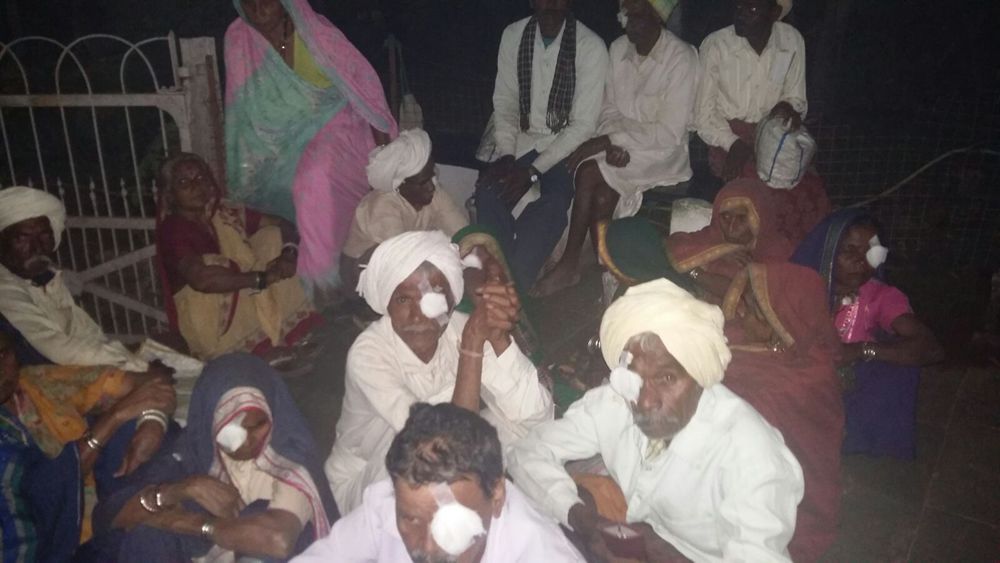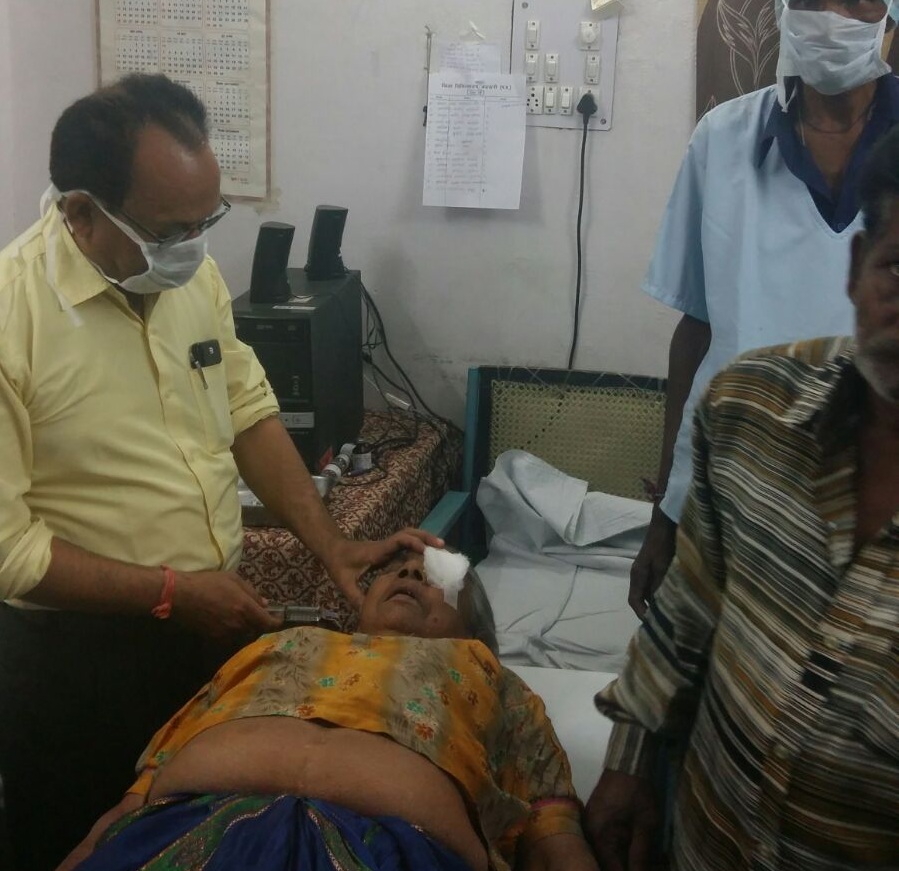Blinded by corruption: Systemic failures cripple Madhya Pradesh healthcare
40 people blinded in a botched eye camp underline corruption and rot across the state’s hospitals.

11.8K
Total Views
Rasheed Kasim of Ekalwara village cannot see.
In order to correct an uncertain vision, he underwent a cataract operation at a camp in Barwani district, Madhya Pradesh, last month – and lost the little sight he had. “I have two daughters to marry off,” Kasim wailed. “What will I do now?”
Kasim is one of 40-odd people, most of them over 60, who have suffered complete loss of vision after being operated on at the camp. 27 of the victims are now being treated at two of Indore’s hospitals- Maharaja Yashwant Rao Hospital and Sri Aurobindo Institute of Medical Science. Doctors there however say these patients will likely never recover their sight.

Photo courtesy by Hemant Garg,Barwani
Dr NK Agrawal, deputy director of the National Programme for Control of Blindness, in a report to the state government said the issue is with a contaminated eye-wash, manufactured by the Indore-based pharmaceutical company Beryl Drugs.
Dr RadheshyamPalod, head of ophthalmology at Barwani district hospital, and six paramedics who assisted in the camp, have been suspended – an act of appeasement that diverts attention from more serious systemic issues.
Barwani’s district hospital, like most others in Madhya Pradesh, is housed in dilapidated premises and lacks basic operating room facilities. Despite the conditions, eye camps have been regularly organised at Barwani – Palod has an estimated 30,000 operations to his credit.
Palod says he has been writing to the health department and the district administration for six years now, asking for facilities to be upgraded. Ajay Singh Gangwar, District Collector of Barwani, admits he is aware of the conditions but has no funds to spare. “Not just the operation theatre, the entire hospital building needs urgent renovation”, Gangwarsays.However Gauri Singh, the state’s Principal Secretary (Health), says the issue of lack of funds was never raised to her.
While bureaucracy passes the buck, "incidents" such as the botched Barwani camp occur with predictable regularity. Three years ago, six patients developed infection after routine eye operations in Seoni district. In the same year, two patients lost their sight at a camp in Khandwa district. In 2014, four patients were blinded in a camp in Chhindwara district.
The state health department facilitates an estimated five lakh cataract operations across the state, almost all of them in hospitals where conditions mirror the sorry state at Barwani.
Where does the money go?
An investigation by the Hindi daily DainikBhaskar in the wake of the botched Barwani camp found that operation theatres in most of the state’s 51 districts are ill-equipped, unhygienic and in violation of the health department’s own basic guidelines.
A day after the story appeared, Chief Minister Shivraj Singh Chouhantold the state assembly that surgical operations in district hospitals across the state would be suspended till facilities were upgraded. He further announced the formation of a three-member committee to suggest improvements. In related moves, the state government banned 19 substandard drugs being supplied by 13 companies, and announced an ‘infectionaudit; of operation theatres across all district hospitals.
Ironically, the state health department’s budget has more than doubled over the past four years –from Rs 2,165 crore in 2011-‘12 to Rs4,805 crore in 2014-‘15. Of this, the government has earmarked Rs180 crore towards purchase of drugs for this financial year alone, in addition to the Rs85 crore that the state received via the Central government’s sponsored health programmes.
Funding, thus, is impressive – and so too, on paper, is the state’s public healthcare system: 51 district hospitals, 334community health centres,66 civil hospitals, 1,171 primary health centres and 9,192 sub-primary centres.

Photo courtesy by Hemant Garg,Barwani
Staffing, however, is woefully inadequate. Against 3,195 sanctioned posts, the state employs only 1,215 medical specialists; only 2,996 medical officers are employed against the 4,833 sanctioned posts. Of these, the majority of officers are unwilling to work in the rural health centres – a problem the chief minister himself has underlined at various times.
Three scams, one big mess
Coupled with this administrative failure is the more glaring inability of the Shivraj Singh Chouhan government to check large-scale corruption in the health sector. The Vyapam scam exposed how a nexus of bureaucrats, middlemen and politicians facilitated admissions of ineligible candidates to the state’s six medical colleges.
A bigger scandal is the large-scale rigging of admission tests for the 1,500 seats in the state’s five private medical colleges. The DMAT (dental and medical test) scam is worth Rs10,000 crore annually, according to whistle-blower Dr AnandRai who has pointed out that private colleges have been admitting affluent students on the basis of sham DMATs, and charging fees ranging from Rs 30 lakh to Rs one crore per seat.
Despite the Vyapam and DMAT scams being widely reported, the state government has done little to make the admission process to medical colleges more transparent.Meanwhile, seven more medical colleges are in line to start operations in the state.
Alongside these two scams is a third, involving misuse of centrally-sponsored health funds to purchase drugs from spurious companies. Three successive state health directors –Dr Yogiraj Sharma, Dr Ashok Sharma and Dr AK Mittal – have been found to possess assets worth hundreds of crores, in income tax raids conducted between 2008 and 2011. Yet, as the Barwani incident underlines, sub-standard drugs continue to be in use throughout the state’s healthcare system.
The political opposition has blamed state Health Minister Dr Narottam Mishra of having links with Beryl Drugs, the Indore-based company that supplied the eye-wash used in Barwani.
The minister has denied the allegation.
In order to correct an uncertain vision, he underwent a cataract operation at a camp in Barwani district, Madhya Pradesh, last month – and lost the little sight he had. “I have two daughters to marry off,” Kasim wailed. “What will I do now?”
Kasim is one of 40-odd people, most of them over 60, who have suffered complete loss of vision after being operated on at the camp. 27 of the victims are now being treated at two of Indore’s hospitals- Maharaja Yashwant Rao Hospital and Sri Aurobindo Institute of Medical Science. Doctors there however say these patients will likely never recover their sight.

Photo courtesy by Hemant Garg,Barwani
Dr NK Agrawal, deputy director of the National Programme for Control of Blindness, in a report to the state government said the issue is with a contaminated eye-wash, manufactured by the Indore-based pharmaceutical company Beryl Drugs.
Dr RadheshyamPalod, head of ophthalmology at Barwani district hospital, and six paramedics who assisted in the camp, have been suspended – an act of appeasement that diverts attention from more serious systemic issues.
Barwani’s district hospital, like most others in Madhya Pradesh, is housed in dilapidated premises and lacks basic operating room facilities. Despite the conditions, eye camps have been regularly organised at Barwani – Palod has an estimated 30,000 operations to his credit.
Palod says he has been writing to the health department and the district administration for six years now, asking for facilities to be upgraded. Ajay Singh Gangwar, District Collector of Barwani, admits he is aware of the conditions but has no funds to spare. “Not just the operation theatre, the entire hospital building needs urgent renovation”, Gangwarsays.However Gauri Singh, the state’s Principal Secretary (Health), says the issue of lack of funds was never raised to her.
While bureaucracy passes the buck, "incidents" such as the botched Barwani camp occur with predictable regularity. Three years ago, six patients developed infection after routine eye operations in Seoni district. In the same year, two patients lost their sight at a camp in Khandwa district. In 2014, four patients were blinded in a camp in Chhindwara district.
The state health department facilitates an estimated five lakh cataract operations across the state, almost all of them in hospitals where conditions mirror the sorry state at Barwani.
Where does the money go?
An investigation by the Hindi daily DainikBhaskar in the wake of the botched Barwani camp found that operation theatres in most of the state’s 51 districts are ill-equipped, unhygienic and in violation of the health department’s own basic guidelines.
A day after the story appeared, Chief Minister Shivraj Singh Chouhantold the state assembly that surgical operations in district hospitals across the state would be suspended till facilities were upgraded. He further announced the formation of a three-member committee to suggest improvements. In related moves, the state government banned 19 substandard drugs being supplied by 13 companies, and announced an ‘infectionaudit; of operation theatres across all district hospitals.
Ironically, the state health department’s budget has more than doubled over the past four years –from Rs 2,165 crore in 2011-‘12 to Rs4,805 crore in 2014-‘15. Of this, the government has earmarked Rs180 crore towards purchase of drugs for this financial year alone, in addition to the Rs85 crore that the state received via the Central government’s sponsored health programmes.
Funding, thus, is impressive – and so too, on paper, is the state’s public healthcare system: 51 district hospitals, 334community health centres,66 civil hospitals, 1,171 primary health centres and 9,192 sub-primary centres.

Photo courtesy by Hemant Garg,Barwani
Staffing, however, is woefully inadequate. Against 3,195 sanctioned posts, the state employs only 1,215 medical specialists; only 2,996 medical officers are employed against the 4,833 sanctioned posts. Of these, the majority of officers are unwilling to work in the rural health centres – a problem the chief minister himself has underlined at various times.
Three scams, one big mess
Coupled with this administrative failure is the more glaring inability of the Shivraj Singh Chouhan government to check large-scale corruption in the health sector. The Vyapam scam exposed how a nexus of bureaucrats, middlemen and politicians facilitated admissions of ineligible candidates to the state’s six medical colleges.
A bigger scandal is the large-scale rigging of admission tests for the 1,500 seats in the state’s five private medical colleges. The DMAT (dental and medical test) scam is worth Rs10,000 crore annually, according to whistle-blower Dr AnandRai who has pointed out that private colleges have been admitting affluent students on the basis of sham DMATs, and charging fees ranging from Rs 30 lakh to Rs one crore per seat.
Despite the Vyapam and DMAT scams being widely reported, the state government has done little to make the admission process to medical colleges more transparent.Meanwhile, seven more medical colleges are in line to start operations in the state.
Alongside these two scams is a third, involving misuse of centrally-sponsored health funds to purchase drugs from spurious companies. Three successive state health directors –Dr Yogiraj Sharma, Dr Ashok Sharma and Dr AK Mittal – have been found to possess assets worth hundreds of crores, in income tax raids conducted between 2008 and 2011. Yet, as the Barwani incident underlines, sub-standard drugs continue to be in use throughout the state’s healthcare system.
The political opposition has blamed state Health Minister Dr Narottam Mishra of having links with Beryl Drugs, the Indore-based company that supplied the eye-wash used in Barwani.
The minister has denied the allegation.

No comments:
Post a Comment